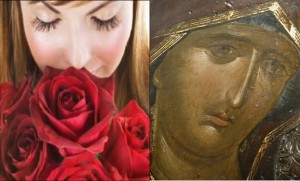Mother’s Day and the Church (Petros Panayiotopoulos)
9 Μαΐου 2016
Mother’s Day today, and all over the world children take the opportunity to remember and honour their mother. Yet there are also those who question the whole commercialization of the business of the adoption of the day as a ‘feast’, while others think that the state of motherhood is so sacred that every day of the year should be dedicated to it, rather than a single day.
For its part, the Church presents the person of the Mother of God as the most outstanding of mothers and discreetly suggests the feast of the Reception of the Lord (2 February) as a day that could be set apart for us to honour mothers.

Within our tradition, we also encounter the Church itself as the mother who gives birth to us and gives us rebirth in Christ, also bringing us to salvation. This doesn’t mean, however, that there’s some kind of contradistinction: her restraint and obedience place Our Lady at the centre of the Church. John the Damascan says that the mystery of divine Dispensation finds its expression in her person. And her unconstrained acceptance of the divine will opened the way for us to return to the bosom of God. The Incarnation of the Divine Word, which took place in her womb, effected the union of the divine and the human. So the Church continues through history as a ‘continuous Mother of God’ (Paul Evdokimov).
Our Lady is the eternal model of motherhood: she suffers with and feels the pain of every wounded person and is, at the same time, the refuge and consolation of all those in tribulation. The sorrowful image of her as the sword penetrates her when she sees her Son suffering for the whole of humankind makes her the outstanding representative of mercy and loving-kindness. She’s the archetypal Mother, who suffers and cares for each and every one of her children, for the sorrow and injustice which hold sway over the world; she’s the continuous sigh for anguished people. In her person, mothers in particular find unique support and total understanding regarding their concerns about the future of their children and the world as a whole. As the poet says: ‘In wars, it’s the mothers who die…’.
This is why the Church’s attitude is to pay exceptional honour to the person of the mother.





